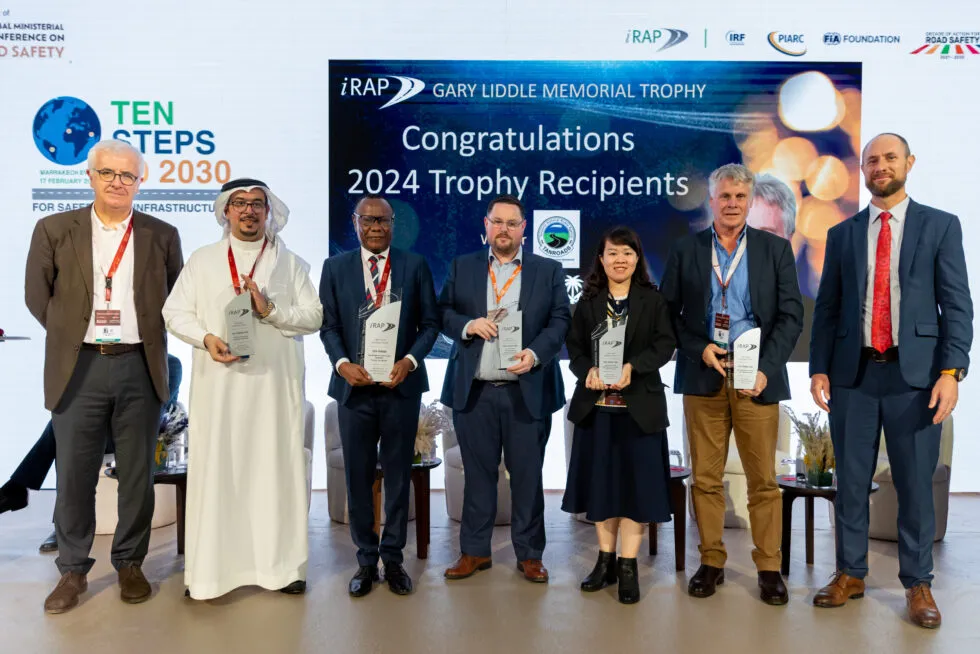
Tanzania National Roads Agency (TANROADS) was the winner of iRAP’s 2024 Gary Liddle Memorial Trophy, presented in Marrakech, Morocco.
The iRAP Trophy honours the lifelong public-sector and transport contribution of the charity’s former chairman Gary Liddle who passed away in 2023. The winner’s trophy is presented to the world’s best performing road authority when it comes to eliminating high-risk roads.
The winner and finalists were announced during the Ten Steps to 2030 for Safer Road Infrastructure Side Event of the 4th Global Ministerial Conference on Road Safety. They were selected from 12 nominations from 11 countries.
Tanzania was the first country in the world to apply the Ten Step Plan for Safer Road Infrastructure with TANROADS successfully achieving reductions in road trauma associated with their elimination of high-risk journeys for all road users across the country.
TANROADS’ Ten Step Plan Initiative has also built sustainable institutional capacity, impact and partnerships that continue to identify and eliminate high-risk roads across Tanzania.
Accepting the award on behalf of TANROADS, was Abdallah Hamis Ulega, minister of works in Tanzania. He said Tanzania was the first country in the world to use the United Nations Road Safety Collaboration (UNRSC) Ten-Step Plan for Safer Road Infrastructure. “It has empowered and fast-tracked road safety improvements in our country, setting us in a good position to halve global road deaths and injuries in the country by 2030 aligned to the UN Sustainable Development Goals”.
Other awards included a Shining Star that went to the Roads General Authority for ‘Safer Roads in Saudi Arabia’. Another Shining Star went to the Himachal Pradesh Roads Infrastructure Development Corporation for ‘Safer Roads in Himachal Pradesh, India’.
Meanwhile, a Rising Star went to the Municipality of Lima, Peru, for ‘Enhancing School Zone Safety through the Colecaminos Programme’. A Rising Star also went to Main Roads Western Australia for the ‘Tonkin Highway Extension’.
Greg Smith, iRAP’s global programme director and acting chief executive, noted that the calibre of nominations this year was very high. However, TANROADS stoodout for its widescale application of the iRAP approach, large scale of mobilised investment focused on all road users, and rapid scaling of partnerships and capacity to save lives. “TANROADS’ programme demonstrates the innovative world-first implementation of the multi-partner collaborative Ten Step Plan for Safer Road Infrastructure approach,” said Smith. “Its effectiveness and transferability is evident today in TANROADS’ achievement and demand for the approach from other countries in the region.”
iRAP’s Gary Liddle served the transport industry for more than 40 years, occupying senior leadership positions, including chief executive of VicRoads, deputy secretary of the department of transport, planning andlLocal infrastructure for ictoria state, chair of ARRB, chair of Austroads and chair of iMOVE. He was also enterprise professor for transport at the University of Melbourne.
In 2017, Liddle was made an Officer in the Order of Australia for “distinguished service to public administration in the Victorian transport sector through leadership in policy direction, infrastructure development, road safety and regulatory reform”.








